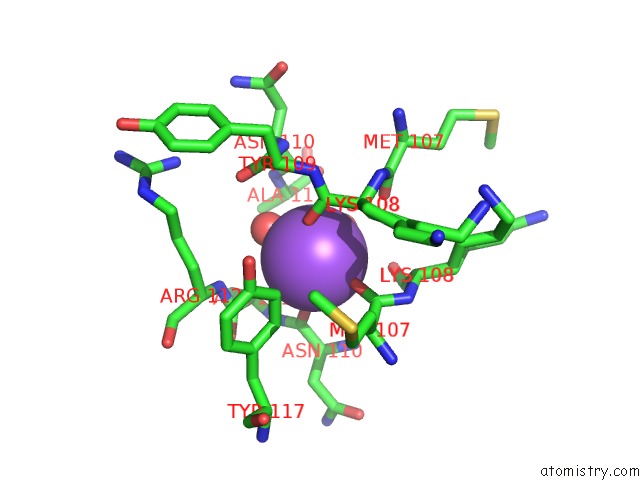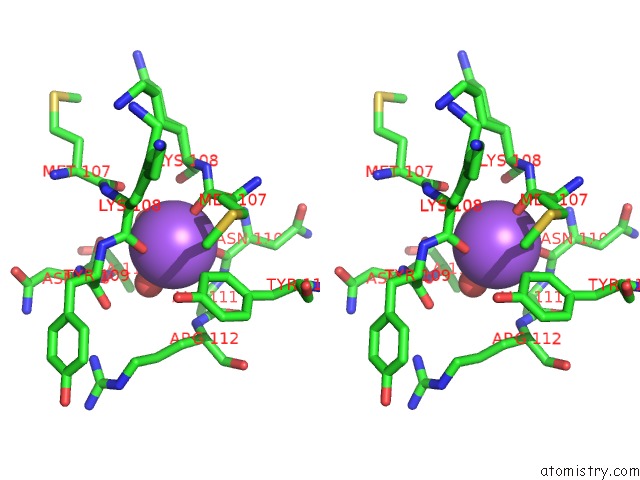Sodium »
PDB 5pt5-5pub »
5pta »
Sodium in PDB 5pta: Pandda Analysis Group Deposition -- Crystal Structure of BRD1 After Initial Refinement with No Ligand Modelled (Structure 154)
Protein crystallography data
The structure of Pandda Analysis Group Deposition -- Crystal Structure of BRD1 After Initial Refinement with No Ligand Modelled (Structure 154), PDB code: 5pta
was solved by
N.M.Pearce,
T.Krojer,
R.Talon,
A.R.Bradley,
M.Fairhead,
R.Sethi,
N.Wright,
E.Maclean,
P.Collins,
J.Brandao-Neto,
A.Douangamath,
Z.Renjie,
A.Dias,
J.Ng,
P.E.Brennan,
O.Cox,
C.Bountra,
C.H.Arrowsmith,
A.Edwards,
F.Vondelft,
with X-Ray Crystallography technique. A brief refinement statistics is given in the table below:
| Resolution Low / High (Å) | 29.12 / 2.19 |
| Space group | P 21 21 21 |
| Cell size a, b, c (Å), α, β, γ (°) | 55.808, 56.585, 101.880, 90.00, 90.00, 90.00 |
| R / Rfree (%) | 19.5 / 24.4 |
Sodium Binding Sites:
The binding sites of Sodium atom in the Pandda Analysis Group Deposition -- Crystal Structure of BRD1 After Initial Refinement with No Ligand Modelled (Structure 154)
(pdb code 5pta). This binding sites where shown within
5.0 Angstroms radius around Sodium atom.
In total only one binding site of Sodium was determined in the Pandda Analysis Group Deposition -- Crystal Structure of BRD1 After Initial Refinement with No Ligand Modelled (Structure 154), PDB code: 5pta:
In total only one binding site of Sodium was determined in the Pandda Analysis Group Deposition -- Crystal Structure of BRD1 After Initial Refinement with No Ligand Modelled (Structure 154), PDB code: 5pta:
Sodium binding site 1 out of 1 in 5pta
Go back to
Sodium binding site 1 out
of 1 in the Pandda Analysis Group Deposition -- Crystal Structure of BRD1 After Initial Refinement with No Ligand Modelled (Structure 154)

Mono view

Stereo pair view

Mono view

Stereo pair view
A full contact list of Sodium with other atoms in the Na binding
site number 1 of Pandda Analysis Group Deposition -- Crystal Structure of BRD1 After Initial Refinement with No Ligand Modelled (Structure 154) within 5.0Å range:
|
Reference:
N.M.Pearce,
T.Krojer,
A.R.Bradley,
P.Collins,
R.P.Nowak,
R.Talon,
B.D.Marsden,
S.Kelm,
J.Shi,
C.M.Deane,
F.Von Delft.
A Multi-Crystal Method For Extracting Obscured Crystallographic States From Conventionally Uninterpretable Electron Density. Nat Commun V. 8 15123 2017.
ISSN: ESSN 2041-1723
PubMed: 28436492
DOI: 10.1038/NCOMMS15123
Page generated: Mon Oct 7 23:39:05 2024
ISSN: ESSN 2041-1723
PubMed: 28436492
DOI: 10.1038/NCOMMS15123
Last articles
Zn in 9MJ5Zn in 9HNW
Zn in 9G0L
Zn in 9FNE
Zn in 9DZN
Zn in 9E0I
Zn in 9D32
Zn in 9DAK
Zn in 8ZXC
Zn in 8ZUF